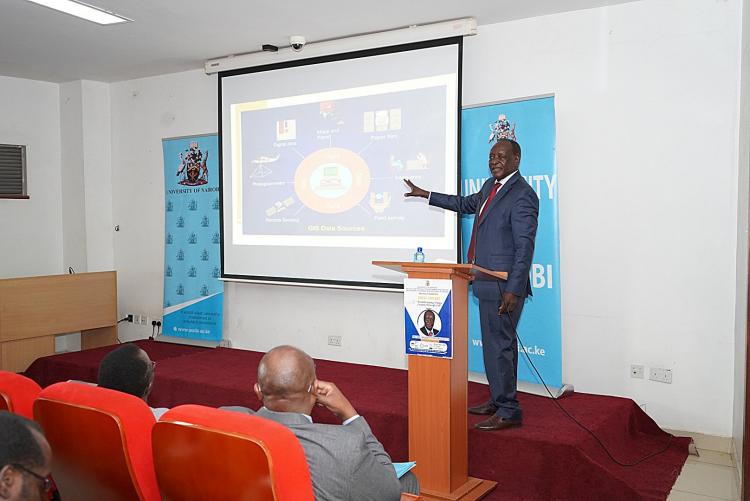“The engine of GIS is DATA—clean, credible data,” declared Vihiga Governor and Geographic Information Systems (GIS) expert, H.E. Dr. Wilber K. Ottichilo, as he delivered a powerful public lecture to students and faculty at the University of Nairobi on Wednesday, April 9, 2025. His address explored the vital link between data-driven governance and sustainable urban development, offering a compelling look at GIS as a tool for equitable transformation.
The event, organized by the Department of Urban and Regional Planning under the Faculty of Built Environment and Design, brought together scholars, urban designers, and aspiring policy leaders eager to learn how geospatial technologies are reshaping governance in Kenya.
Speaking under the theme “The Use of Geospatial Technologies (GIS) as a Support System for Spatial Planning for Counties,” Dr. Ottichilo’s lecture—titled “Transforming Vihiga County through GIS”—highlighted how his administration has applied GIS to enhance service delivery, infrastructure planning, environmental management, and project monitoring.
Widely known for advocating data-driven leadership, Dr. Ottichilo emphasized the analytical power of GIS in converting raw data into actionable insights. “GIS without data is like a body without a soul,” he said. “Its power lies in transforming data into knowledge for informed decision-making.”
Using Vihiga County as a case study, he explained how spatial data—when accurately collected and analyzed—supports evidence-based planning. Under his leadership, Vihiga established a state-of-the-art Geospatial Technologies Service (GTS) Lab, becoming one of the first counties in Kenya to institutionalize a GIS-based planning system. The lab has significantly improved resource allocation, development tracking, and environmental conservation efforts.
He further stressed the importance of embedding Environmental, Social, and Governance (ESG) principles in all planning efforts, framing them as essential for long-term sustainability. “GIS is not just a tool. It is a mindset—a way to see, interpret, and solve complex development challenges,” he told the audience.
Dr. Munyua Mwaura, Chairman of the Department of Urban and Regional Planning, underscored the significance of connecting academic theory with real-world application. “Hosting Dr. Ottichilo provides our students and faculty with a practical perspective on the concepts we teach—like spatial analysis and participatory planning—being used to drive real change,” he said. “His leadership shows how good data, when paired with sound policy, delivers lasting impact.”
Prof. Lilac Osanjo, Dean of the Faculty, commended the governor’s visionary approach and humility, noting that his presence underscored the university’s mission to nurture graduates who shape the built environment. “This engagement reminds our students that their studio work can influence national development,” she said.
Governor Ottichilo closed with a passionate appeal: “GIS isn’t just software—it’s an ethical compass. Kenya’s future hinges on data-empowered governance.” As counties strive for inclusive and efficient administration, the message was clear: the foundation for transformation is already in place—and it begins with data.
- Log in to post comments

